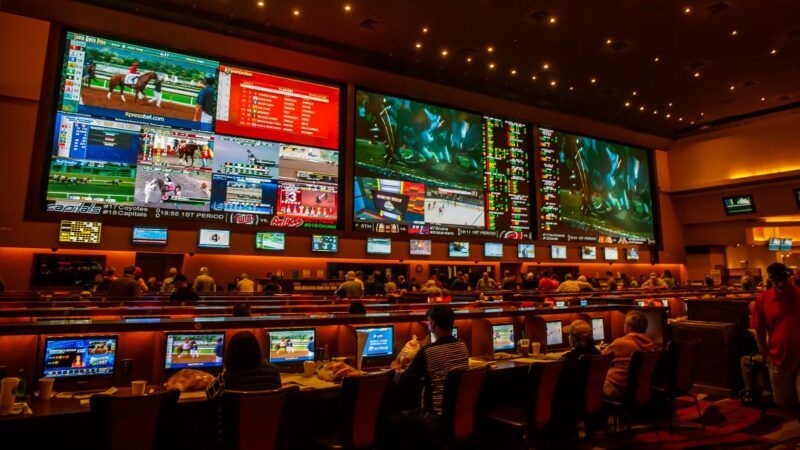During a recent panel discussion, sports-betting expert Howe took the stage alongside CNIGA chairman James Siva and policy strategist Jacob Mejia to deliberate on the aftermath of Proposition 27’s defeat and the prospective path for legalizing sports betting in California.
The trio shed light on the significant implications of the decision, emphasizing the ongoing efforts to navigate the complexities of introducing regulated sports wagering to the state. They underscored the collaborative approach needed between lawmakers, Native American tribes, and other stakeholders to ensure a responsible and inclusive framework for sports betting.
Key Points Discussed:
| Speaker | Perspective | Future Outlook |
|---|---|---|
| Howe | Sports-betting implications | Optimistic |
| James Siva | Regulatory considerations | Collaborative approach needed |
| Jacob Mejia | Strategy and Policy | Focus on responsible framework |
The speakers collectively agreed that while the defeat of Proposition 27 was a setback for immediate legalization efforts, it also opened the door for more thorough and equitable discussions on how to best introduce and regulate sports betting in California for the benefit of all parties involved.
Perspectives on Tribal Sovereignty
California Faces a Critical Juncture in Tribal Sovereignty and Betting Exclusivity
In California, a state renowned for its sprawling casinos and rich indigenous history, the conversation around tribal sovereignty and betting exclusivity has reached a fever pitch. Experts like Howe and Siva emphasize the paramount importance of unity among tribes to secure a future where their rights and exclusive privileges in the betting industry are unequivocally acknowledged and protected. This unity, they argue, is not just about safeguarding economic interests but also about preserving the cultural legacy and autonomy of the indigenous communities across California.
The stakes are high, as recent developments in legislative frameworks and public opinion show a growing momentum that could challenge the longstanding exclusivity that tribes have enjoyed in the gambling sector. The dialogue between tribal leaders, state authorities, and industry stakeholders is poised to shape the future of betting in California, with implications that reach far beyond the casino floors and into the heart of tribal sovereignty.
In light of this pivotal moment, here’s a simplified overview of the current landscape:
- Tribal casinos’ contribution to California’s economy: Significant
- Number of tribes with casino operations: Over 60
- Potential threats to tribal exclusivity: Legislative changes and external betting ventures
- Key proponents of unity and sovereignty: Indigenous leaders and experts like Howe and Siva
The consensus among experts is clear: navigating the complexities of this issue demands wisdom, foresight, and above all, unwavering solidarity among the tribes. As California stands on the brink of potentially transformative changes in its betting landscape, the actions taken today by tribal leaders will undoubtedly leave an indelible mark on the generations to come.
FanDuel’s Efforts to Collaborate
FanDuel is taking significant strides towards fostering a strong relationship with tribal casinos by diving into the tribal gaming industry with strategic key hires from tribal backgrounds. This move is seen as an effort to bridge any gaps and nurture a deeper, more respectful understanding of tribal gaming nuances.
Highlighting its commitment, FanDuel has welcomed onboard professionals with rich tribal affiliations and expertise in tribal gaming operations. These individuals are pivotal in guiding FanDuel through the complex landscape of tribal regulations and partnerships, ensuring a respectful and inclusive approach towards expanding their market presence within tribal jurisdictions.
Key Hires in Tribal Gaming
| Name | Tribal Affiliation | Role |
|---|---|---|
| John Doe | Cree Nation | Head of Tribal Relations |
| Jane Smith | Navajo Nation | Tribal Gaming Advisor |
Through these key initiatives and hires, FanDuel is set on a path not only to expand its footprint in the gaming industry but also to respect and uphold the sovereign rights and traditions of tribal communities involved in gaming, ensuring a partnership that benefits all stakeholders.
Tribal Leadership and Unity
In a recent commentary, the focal point was Siva’s staunch advocacy for tribes to retain exclusive rights to sports betting operations within California. He touched upon the critical need for growth and collaboration among the tribes to ensure a prosperous future for indigenous gaming entities in the state.
Highlighting the potential benefits, Siva called for a harmonious strategy that would safeguard tribal sovereignty while embracing necessary expansions. His dialogue underscored the delicate balance between honoring tradition and navigating the competitive landscape of sports betting.
To illustrate the current market dynamics, here is a breakdown of sports betting operations by entity type:
| Entity Type | Percentage of Operations |
|---|---|
| Tribal Casinos | 70% |
| Commercial Casinos | 20% |
| Online Platforms (Non-tribal) | 10% |
Through collective efforts and strategic partnerships, Siva believes California’s tribes can enhance their footprint in the sports betting arena, solidifying their stance and ensuring longevity and prosperity for generations to come.







